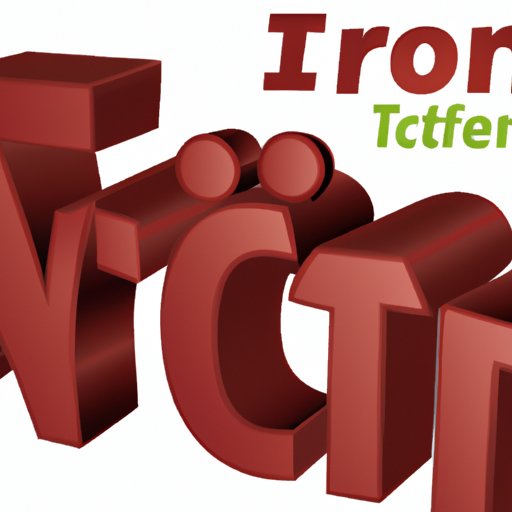Introduction
Iron is an essential mineral that plays an important role in many bodily functions, including energy metabolism and oxygen transport. It’s a key component of hemoglobin, which carries oxygen from your lungs to all parts of your body. Without enough iron, your body can’t produce enough healthy red blood cells, leading to a condition known as iron deficiency anemia. That’s why it’s so important to get enough iron in your diet.

The Role of Iron in Nutrient Balance
Iron is an essential nutrient that helps the body absorb other nutrients, such as vitamin A, B12, and folic acid. It also helps maintain energy levels and promotes overall health. The daily recommended intake for adults is 8 mg for men and 18 mg for women. Pregnant women may need even more iron, depending on their individual needs.
How to Get Enough Iron from Your Diet
Getting enough iron from your diet is important for maintaining good health. There are two types of dietary iron: heme iron, which comes from animal sources, and non-heme iron, which comes from plant sources. Heme iron is more easily absorbed by the body than non-heme iron, so it’s important to include a variety of foods in your diet to ensure you’re getting enough iron.
Understanding Iron Deficiency
Iron deficiency is the most common nutrient deficiency in the world. Symptoms of iron deficiency anemia include fatigue, dizziness, pale skin, hair loss, brittle nails, headaches, and difficulty concentrating. If left untreated, iron deficiency anemia can lead to serious health complications.
Food Sources of Iron
There are many foods that are rich in iron. Animal sources of heme iron include red meat, poultry, fish, and eggs. Plant sources of non-heme iron include beans, lentils, nuts, seeds, dark leafy greens, whole grains, and fortified cereals. Eating a variety of iron-rich foods will help ensure you’re getting enough iron in your diet.
Tips for Increasing Iron Intake through Diet
In addition to eating a variety of iron-rich foods, there are several other ways to increase your iron intake. Eating foods high in vitamin C, such as citrus fruits and tomatoes, can help your body absorb more iron. Avoiding tea and coffee with meals can also help, as these beverages can inhibit iron absorption. Lastly, avoiding dairy products with meals can help, as calcium can interfere with iron absorption.
Supplements for Increasing Iron Intake
If you’re not able to get enough iron from your diet, you may need to take an iron supplement. Iron supplements come in different forms, including tablets, capsules, and liquids. Before taking an iron supplement, it’s important to speak with your doctor or healthcare provider to determine the right type and dosage for you. Overdosing on iron can cause serious side effects, so it’s important to follow your doctor’s instructions.

Pros and Cons of Iron Supplements
Iron supplements can be beneficial for those who are unable to get enough iron from their diet. However, it’s important to consider the potential risks associated with taking an iron supplement. Iron supplements can cause constipation, nausea, abdominal pain, and other gastrointestinal issues. They can also interact with certain medications and cause side effects, so it’s important to talk to your doctor before taking an iron supplement.

Recommended Dosage for Iron Supplements
The recommended dosage for iron supplements varies depending on your age, sex, and health status. Generally, adult men should take no more than 8 mg per day, while adult women should take no more than 18 mg per day. Pregnant women may need more, depending on their individual needs. It’s important to speak with your doctor before taking any iron supplements to determine the right dosage for you.
Conclusion
Iron is an essential nutrient that plays a crucial role in the human body. Getting enough iron from your diet is important for maintaining good health. Eating a variety of iron-rich foods and avoiding foods that inhibit iron absorption can help ensure you’re getting enough iron. Iron supplements may be necessary for some people, but they should be taken only under the guidance of a healthcare professional. By following these guidelines, you can help ensure you’re getting enough iron to stay healthy and strong.


